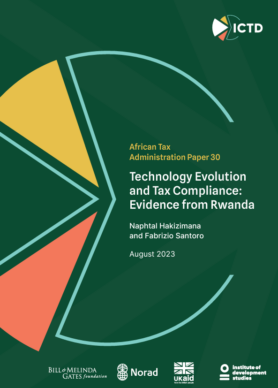African Tax Administration Paper 30
Information technology (IT) has great potential to help increase taxpayer compliance and revenue collection. Despite the increasing use of IT solutions by African tax administrations, evidence on its effectiveness remains limited. In Rwanda, the Revenue Authority introduced a more advanced version of its electronic billing machines (EBM) to enhance its ability to track business transactions remotely and to improve taxpayers’ experience of using the machines. Using a wealth of administrative data collected by the Revenue Authority, this paper evaluates the impact of the adoption of EBM2 on the ways in which firms file their tax returns. In particular, we are able to compare first-time users of EBM2, who are mostly new taxpayers, with ‘shifters’, who moved from the old EBM1 to EBM2. We looked first at value added tax (VAT). Overall, the adoption of EBM2 resulted in significant increases in reported business turnover, non-taxable sales, taxable sales, VAT inputs and VAT due. There was also a reduction in the proportion of completed VAT returns that implied zero VAT liabilities. Unsurprisingly, there was no significant overall change in the VAT returns from ‘shifters’. They had probably internalised the benefits of electronic billing machines when using the earlier EBM1 version. The effects of the adoption of EBM2 on income tax returns are less positive. Overall, no increase in income tax liability is reported. These results suggest that taxpayers do not believe that the Revenue Authority will attempt to reconcile their (separate) VAT and income tax returns. Taxpayers probably provide more reliable VAT returns because they believe, on the basis of the installation of electronic billing machines, with upgrades, that the Revenue Authority is focusing more on VAT. The main policy implication is that the Revenue Authority should make more effort to reconcile firms’ separate VAT and income tax returns, so that the positive effects of the new electronic billing machines on VAT compliance will spillover into income tax compliance.
